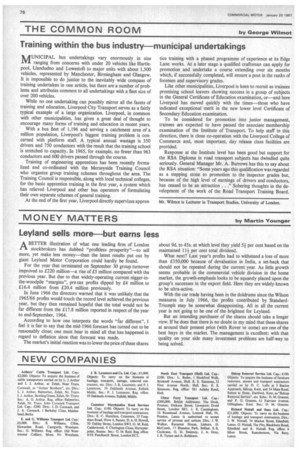Leyland sells more—but earns less
Page 78

If you've noticed an error in this article please click here to report it so we can fix it.
ABETTER illustration of what one leading firm of London stockbrokers has dubbed "profitless prosperity"—to sell more, yet make less money—than the latest results put out by giant Leyland Motor Corporation could hardly be found.
For the year that terminated on September 30 group turnover improved to £220 million—a rise of £5 million compared with the previous year. But due to that widely-operating current nigger-inthe-woodpile "margins", pre-tax profits dipped by £4 million to £16.4 million from £20.4 million previously.
In June 1966 the directors warned that it was unlikely that the 1965/66 profits would touch the record level achieved the previous year, but they then remained hopeful that the total would not be far different from the £17.8 million reported in respect of the year to end-September, 1964.
According to how one interprets the words "tar different", I feel it is fair to say that the mid-1966 forecast has turned out to be reasonably close; one must bear in mind all that has happened in regard to deflation since that forecast was made.
The market's initial reaction was to lower the price of these shares about 9d. to 45s. at which level they yield 5+ per cent based on the maintained 111 per cent total dividend.
What next? Last year's profits had to withstand a loss of more than £350,000 because of devaluation in India, a set-back that should not be repeated during the current year. As little growth seems probable in the commercial vehicle division in the home market, the growth-emphasis looks to be squarely placed upon the group's successes in the export field. Here they are widely-known to be ultra-active.
With the car trade having been in the doldrums since the Wilson measures in July 1966, the profits contributed by StandardTriumph may be somewhat disappointing. All in all the current year is not going to be one of the brightest for Leyland.
But an intending purchaser of the shares should take a longer view. If he does that there is no doubt in my mind that these shares at around their present price (with Rover to come) are one of the best buys in the market. The management is excellent; with that quality on your side many investment problems are half-way to being solved.




























































































































